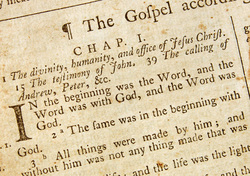William Tyndale Translates Bible into Modern English - 1526 A.D.

It was an act that would ultimately cost him his life, and William Tyndale probably knew it. His decision to translate the entire Bible into English, (previously only available in English), was a bold and provocative one, of which the Catholic Church and the King of England thoroughly disapproved. While others had translated parts of the Bible into Modern English, this was the first complete version, and the first to be made widely available to the public, taking advantage of Gutenberg’s printing press that had been invented less than a century earlier.
His New testament was published while in exile from England in Cologne in 1526, while his Old Testament, which wasn't completed by his death in 1936, was published in parts, beginning with his Pentateuch in 1930.
The significance of Tyndale’s achievements go far beyond the direct and obvious religious ones (although these too were undoutedly significant, challenging the Catholic Church and helping propel the Reformation in England). It changed how people in the English-speaking world communicated and related to each other. No longer did the lesser educated majority need to congregate together regularly to listen to the Bible being read to them. For the first time, they could read and study it for themselves. As a result, the media through which communication and learning could occur were expanded to include the written word alongside the already established oratory tradition. Further, this perhaps signaled the beginning of a decline in the collectivist culture amongst the lower classes, and propelled England, along with the numerous countries that She spawned, into the highly individualist societies that exist today.
In addition to this, Tyndale’s translation was significant in the development of the Modern English language, adding numerous new words and phrases to the English language, such as “Passover”, “scapegoat”, “twinkling of an eye” and “signs of the times”. Tyndale’s achievements were undoubtedly a landmark in mass media history, and their effects continue to reverberate around the English-speaking world to this day.
His New testament was published while in exile from England in Cologne in 1526, while his Old Testament, which wasn't completed by his death in 1936, was published in parts, beginning with his Pentateuch in 1930.
The significance of Tyndale’s achievements go far beyond the direct and obvious religious ones (although these too were undoutedly significant, challenging the Catholic Church and helping propel the Reformation in England). It changed how people in the English-speaking world communicated and related to each other. No longer did the lesser educated majority need to congregate together regularly to listen to the Bible being read to them. For the first time, they could read and study it for themselves. As a result, the media through which communication and learning could occur were expanded to include the written word alongside the already established oratory tradition. Further, this perhaps signaled the beginning of a decline in the collectivist culture amongst the lower classes, and propelled England, along with the numerous countries that She spawned, into the highly individualist societies that exist today.
In addition to this, Tyndale’s translation was significant in the development of the Modern English language, adding numerous new words and phrases to the English language, such as “Passover”, “scapegoat”, “twinkling of an eye” and “signs of the times”. Tyndale’s achievements were undoubtedly a landmark in mass media history, and their effects continue to reverberate around the English-speaking world to this day.
